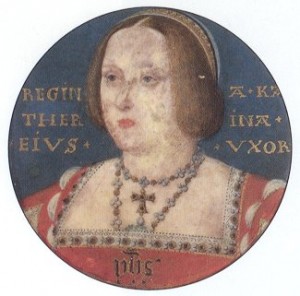 On Wednesday 3rd July 1533, Catherine of Aragon’s chamberlain William Blount, Lord Mountjoy, was instructed to inform his mistress that she was to recognise her new title of “Princess Dowager” and to refrain from referring to herself as “Queen”. The annulment of Catherine’s marriage to Henry VIII had been declared by Archbishop Thomas Cranmer on 23rd May 1533, following Convocation’s ruling, and Anne Boleyn was now Henry’s wife and queen.
On Wednesday 3rd July 1533, Catherine of Aragon’s chamberlain William Blount, Lord Mountjoy, was instructed to inform his mistress that she was to recognise her new title of “Princess Dowager” and to refrain from referring to herself as “Queen”. The annulment of Catherine’s marriage to Henry VIII had been declared by Archbishop Thomas Cranmer on 23rd May 1533, following Convocation’s ruling, and Anne Boleyn was now Henry’s wife and queen.
Mountjoy’s instructions were sent in a letter written by Thomas Cromwell on behalf of the King’s council:
“As the King cannot have two wives he cannot permit the Dowager to persist in calling herself by the name of Queen, especially considering how benignantly and honorably she has been treated in the realm. She is to satisfy herself with the name of Dowager, as prescribed by the Act of Parliament, and must beware of the danger if she attempt to contravene it, which will only irritate the feelings of the people against her. If she be not persuaded by these arguments to avoid the King’s indignation, and relent from her vehement arrogancy, the King will be compelled to punish her servants, and withdraw her affection from his daughter. Finally, that as the marriage is irrevocable, and has passed the consent of Parliament, nothing that she can do will annul it, and she will only incur the displeasure of Almighty God and of the King.”1
Lord Mountjoy, Sir Robert Dymok, John Tyrell, Gryffith Richards and Thomas Vaulx delivered the instructions to Catherine at Ampthill and then reported back to Cromwell:
“To the effect that on Thursday, 3 July, they found her lying on a pallet, as she had pricked her foot with a pin, and could not stand, and was also sore annoyed with a cough. On our declaring that our instructions were to her as Princess Dowager, she took exception to the name, persisting that she was the King’s true wife, and her children were legitimate, which she would claim to be true during her life. To our assertion that the marriage with Anne Boleyn had been adjudged lawful by the universities, the Lords and Commons, she said the King might do in his realm by his royal power what he would ; that the cause was not theirs but the Pope’s to judge, as she had already answered the duke of Norfolk. To other arguments, that she might damage her daughter and servants, she replied she would not damn her own soul on any consideration, or for any promises the King might make her. She did not defend her cause upon obstinacy, nor to create any dissension in the realm, but to save her own rights; and as for the withdrawing of the King’s affection from her, she would daily pray for the preservation of his estate ; but as she sues by his licence, she trusts in so doing to lose no part of his favor. In fine, she will not abandon the title till such time as a sentence is given to the contrary by the Pope. She asked for a copy of these instructions, which she would translate into Spanish, and send to Rome.”2
The words “Princess Dowager” in the report were obliterated by Catherine, who did not agree with the title being used and refused to accept it. Catherine did not accept the annulment of her marriage and believed that she was still Henry VIII’s true wife and queen in God’s eyes. She never did accept the ‘demotion’ and she felt that Henry was endangering his soul by his actions.
Notes and Sources
- LP vi. 759
- Ibid., 760